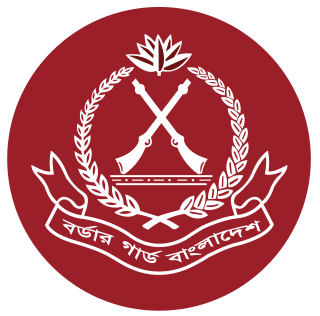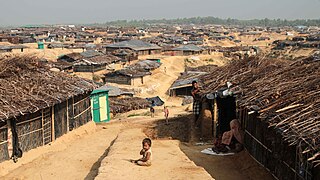Related Research Articles

The Rohingya people are a stateless Indo-Aryan ethnic group who predominantly follow Islam and reside in Rakhine State, Myanmar. Before the Rohingya genocide in 2017, when over 740,000 fled to Bangladesh, an estimated 1.4 million Rohingya lived in Myanmar. Described by journalists and news outlets as one of the most persecuted minorities in the world, the Rohingya are denied citizenship under the 1982 Myanmar nationality law. There are also restrictions on their freedom of movement, access to state education and civil service jobs. The legal conditions faced by the Rohingya in Myanmar have been compared to apartheid by some academics, analysts and political figures, including Nobel laureate Bishop Desmond Tutu, a South African anti-apartheid activist. The most recent mass displacement of Rohingya in 2017 led the International Criminal Court to investigate crimes against humanity, and the International Court of Justice to investigate genocide.

The Naf River is an international river marking the border of southeastern Bangladesh and northwestern Myanmar.

The Border Guard Bangladesh (BGB) is a paramilitary force responsible for the border security of Bangladesh. The force is known as "The Vigilant Sentinels of the National Frontier". The BGB is entrusted with the responsibility to defend the 4,427 kilometres (2,751 mi) border of Bangladesh. It was formerly known as the Bangladesh Rifles (BDR).

The Golden Triangle is the area in which the borders of China, Thailand, Laos, and Myanmar meet at the confluence of the Ruak and the Mekong Rivers. The name "Golden Triangle" was coined by the CIA and is commonly used more broadly to refer to an area of approximately 950,000 square kilometres (367,000 sq mi) that overlaps the mountains of the four adjacent countries.

Ya ba is a drug containing a mixture of methamphetamine and caffeine. It was formerly known as yama, and now goes by a variety of names, including "bikers' coffee" and "kamikaze". Although it is illegal, it has considerable usage in Southeast Asian nations.
The illegal drug trade in China is influenced by factors such as history, location, size, population, and current economic conditions. China has one-sixth of the world's population and a large and expanding economy. China's large land mass, close proximity to the Golden Triangle, Golden Crescent, and numerous coastal cities with large and modern port facilities make it an attractive transit center for drug traffickers. Opium has played an important role in the country's history since before the First and Second Opium Wars in the mid-19th century.

The neighbouring countries of Bangladesh and Myanmar had a generally frosty relationship under the Burmese military junta as a result of the presence of over 270,000 Rohingya refugees in Bangladesh often served as a major irritant. The civil society and political class of Bangladesh often voiced solidarity for Burma's pro-democracy struggle. However, relations between the two nations have nose-dived exponentially as a result of Rohingya genocide which has resulted in the influx of over 1.1 million Rohingya refugees from Rakhine State in Myanmar, to Bangladesh.

The Dhaka Tribune is a major Bangladeshi English-language daily newspaper based in Dhaka, the country's capital and largest city. It also operates an online portal known as the Bangla Tribune. The newspaper has a strong readership in Bangladeshi cities, particularly among the young generation, the diplomatic community, and expatriates; as well as a wide readership in South Asia and internationally. The newspaper is notable for its highly diverse op-ed content, with contributions from leading Bangladeshi, South Asian and international columnists. It also organizes the Dhaka Literary Festival.

The cultivation, transport, sale, purchase, and possession of all forms of cannabis has been illegal in Bangladesh since the late 1980s, but enforcement efforts are lax and the drug continues to be popular there. Since 2017, enforcement has become harsh on marijuana laws and the government has been cracking down on cannabis.
Abdur Rahman Bodi is a Bangladesh Awami League politician and a former Jatiya Sangsad member representing the Cox's Bazar-4 constituency during 2009–2019.

The Rohingya genocide is a series of ongoing persecutions and killings of the Muslim Rohingya people by the military of Myanmar. The genocide has consisted of two phases to date: the first was a military crackdown that occurred from October 2016 to January 2017, and the second has been occurring since August 2017. The crisis forced over a million Rohingya to flee to other countries. Most fled to Bangladesh, resulting in the creation of the world's largest refugee camp, while others escaped to India, Thailand, Malaysia, and other parts of South and Southeast Asia, where they continue to face persecution. Many other countries refer to the events as "ethnic cleansing".
Ataullah abu Ammar Jununi is the leader of the Arakan Rohingya Salvation Army (ARSA), a Rohingya insurgent group active in northern Rakhine State. Ataullah appears in several videos released online by ARSA, where he gives press statements and speeches.

Rohingya refugees in Bangladesh mostly refer to Forcibly Displaced Myanmar Nationals (FDMNs) from Myanmar who are living in Bangladesh. The Rohingya people have experienced ethnic and religious persecution in Myanmar for decades. Hundreds of thousands have fled to other countries in Southeast Asia, including Malaysia, Indonesia, and Philippines. The majority have escaped to Bangladesh, where there are two official, registered refugee camps. Recently violence in Myanmar has escalated, so the number of refugees in Bangladesh has increased rapidly. According to the UN Refugee Agency (UNHCR), more than 723,000 Rohingya have fled to Bangladesh since 25 August 2017.

The Bangladesh–Myanmar border is the international border between the countries of Bangladesh and Myanmar. The border stretches 271.0 kilometres, from the tripoint with India in the north, to the Bay of Bengal in the south. About 210 km (130 mi) of the border is fenced, with the government of Myanmar announcing in 2017 that it was planning to fence off the rest of the border.
The Border Guard Police are a department of Myanmar's Myanmar Police Force, they're paramilitary police specialising in border control, counterinsurgency, crowd control and security checkpoints in border areas and insurgent areas, gathering intelligence in local areas to counterinsurgency and counter perpetrators in border areas, internal security, law enforcement in border areas and insurgency areas, and protecting agency assets in risky areas. The BGP operate in northern Rakhine State and are especially active along the Bangladesh–Myanmar border, due to the ongoing exodus of Rohingya people fleeing sectarian violence in Myanmar. In addition to border security, the BGP are also responsible for manning checkpoints and documenting the movement of Rohingyas within Rakhine State.
Leda makeshift settlement is a refugee camp constructed for Rohingya refugees on government-owned land in Nhilla Union of the Teknaf sub-district in Cox's Bazar, Bangladesh. The camp is located some 15 km (9.3 mi) from Teknaf town.
The Bangladesh drug war or Bangladesh's war on drugs is an ongoing campaign against alleged drug dealers and users by the government of Bangladesh under Prime Minister Sheikh Hasina. The extrajudicial killings of alleged drug dealers by the elite anti-crime unit Rapid Action Battalion (RAB) and the police have been criticized by human rights groups and foreign diplomats.
Killing of Ekramul Haque refers to the extrajudicial killing of Ekramul Haque, councillor of Teknaf Municipality Ward three, by a unit of Rapid Action Battalion. That resulted in Teknaf Municipality three times in a row as a candidate of Awami League. Haque was a former President of Teknaf unit of Jubo League, the youth wing of Awami League, for 13 years. Bangladesh government was carrying a crackdown on the narcotics trade and the death of more than a 100 suspects in shoot-outs with law enforcement agencies. Since 2018 more than 200 individuals were killed in extrajudicial shootings by law enforcement agencies in Teknaf alone.
Miftah Uddin Ahmed is a Bangladesh Army Lieutenant Colonel and officer of Rapid Action Battalion who has been sanctioned by the United States for human rights violations.
Jaliadwip is an island of Teknaf Upazila, Chittagong District in South-Eastern Bangladesh.
References
- 1 2 3 Thompson, Nathan A. "Yaba addiction: The dark side of Bangladesh's increasing affluence". CNN. Retrieved 2018-05-30.
- 1 2 "Yaba addiction rises 30%". Dhaka Tribune. 2016-12-19. Retrieved 2018-05-30.
- ↑ "From parties to residences: How yaba is spreading like wildfire". Dhaka Tribune. 2018-03-15. Retrieved 2018-05-30.
- 1 2 Newspaper, the (2018-05-23). "Yaba drug crisis in Bangladesh out of control". Dawn. Retrieved 2018-05-30.
- ↑ "Listed Teknaf drug peddlers not in scene for now". The Independent. Dhaka. Retrieved 2018-05-31.
- ↑ "Yaba, the 'Madness Drug', Is Finding New Routes Into Bangladesh | VICE News". VICE News. Retrieved 2018-05-31.
- ↑ "Inside Bangladesh's methamphetamine problem". Nikkei Asian Review. Retrieved 2018-05-30.
- ↑ "Bangladesh cricket player in police custody for possessing yaba drug". Hindustan Times. 2018-04-23. Retrieved 2018-05-30.
- ↑ "Bangladesh has 7 million drug addicts, 'over half of them are addicted to yaba'". bdnews24.com. Retrieved 2018-05-30.
- ↑ "Bangladesh sees meth boom amid Rohingya crisis". Dhaka Tribune. 2018-03-30. Retrieved 2018-05-30.
- ↑ "New frontline in Asia's crackdown on drugs". Reuters. 2018-08-13. Retrieved 2018-08-15.
- ↑ "Bangladesh Launches a Deadly Narcotics Crackdown". Time. Retrieved 2018-05-30.
- 1 2 Bengali, Shashank. "Asia's newest drug war leaves more than 90 people dead in less than two weeks". Los Angeles Times. Retrieved 2018-05-31.
- ↑ "Anti-narcotics Drive: 75 held in capital's Jatrabari, Mirpur". The Daily Star. 2018-05-29. Retrieved 2018-05-30.
- ↑ "A war that might not go anywhere". The Daily Star. 2018-05-29. Retrieved 2018-05-31.
- ↑ Quadir, Serajul. "Bangladesh to ban cold pill chemical to fight meth surge". U.S. Retrieved 2018-05-30.